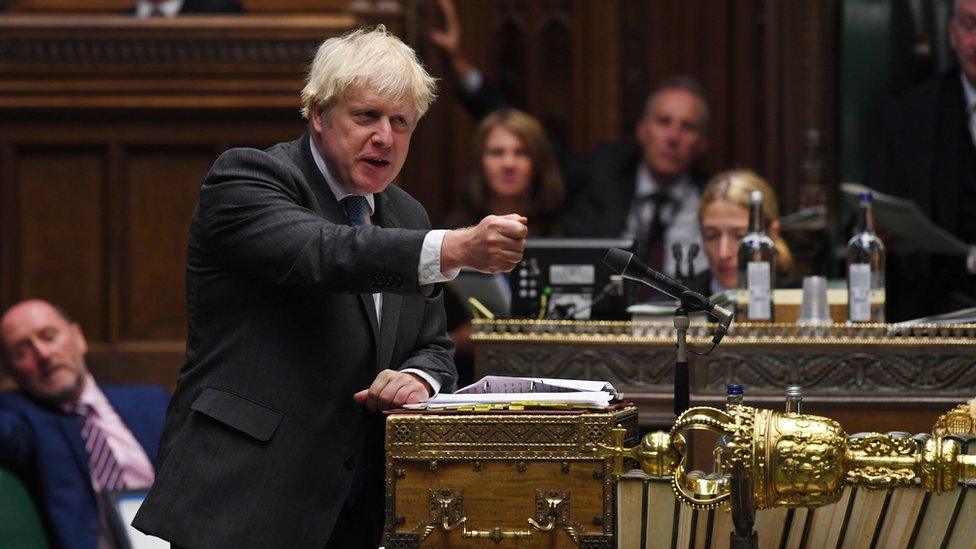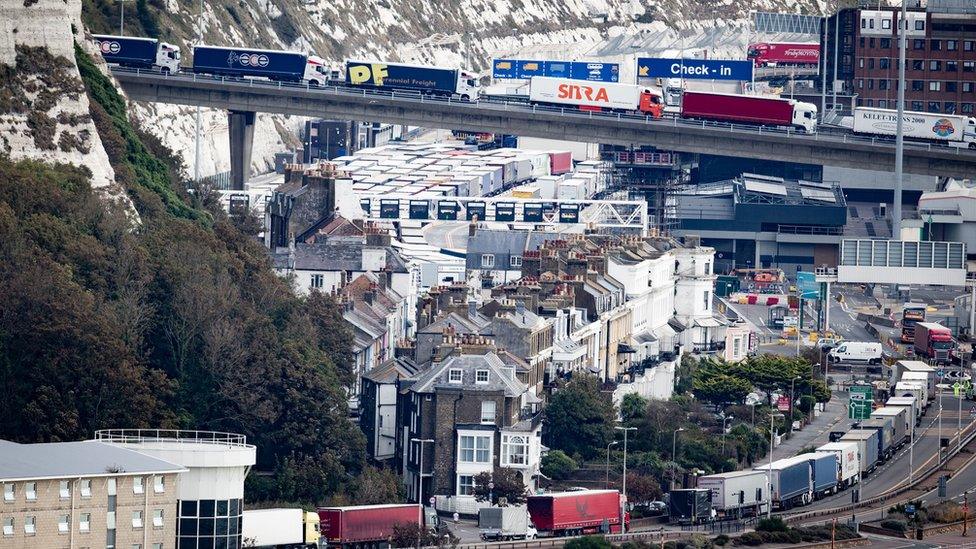The week ahead in Parliament
- Published

Will Covid-19 or the UKIMB dominate this week?
The published Commons agenda sees two days of debate on the UK Internal Market Bill, but there's a sense that developments relating to the pandemic are now moving pretty fast, so watch out for ministerial statements and urgent questions about the government's response.
On the Internal Market Bill, the government seems to have defused the backbench Tory rebellion in the Commons, with an offer of a further vote before powers to override international law come into effect.
But in the Lords, which takes its committees seriously, the bill may be a harder sell for ministers.
The Lords EU Environment Sub-Committee has accused Environment Secretary George Eustice of failing to acknowledge concerns over possible checks and controls on goods moving from the rest of the UK to Northern Ireland if the UK and EU fail to strike a trade deal.
The committee has also warned about the possible impact on all-Ireland supply chains, as well as what it called the "challenging timetable" to implement the Northern Ireland Protocol part of the UK's withdrawal agreement.
Fireproof bill?
That's just one committee - the verdict of others, like the Constitution Committee and the Delegated Powers Committee, could stoke up pressure for a hostile amendment of some kind, when the bill comes before their Lordships.
The Constitution Committee is organising panels of experts to give evidence on the legal and devolution implications next week. The Lords could yet make changes and bounce the bill back to MPs.
There's been much talk of the 1945 Salisbury Convention making the bill fireproof.
But that agreement, reached after the Attlee landslide, was a guarantee that peers (there was then a Conservative majority in the Lords) would not seek to block a bill promised in an election manifesto, at second or third reading stage; it does not preclude amendments the government does not like in between.
Meanwhile, the Lords could see the first serious attempt to challenge a pandemic regulation.
The Lib Dem Baroness Grender has a "Prayer to Annul" down against the latest regulations intended, in line with a government promise, to prevent people who've fallen into rent arrears during the pandemic facing court proceedings for eviction.
She's concerned that a major loophole would potentially allow tens of thousands of eviction cases to go ahead, where they were started between March and August.
The exact number of people affected is not clear, and she put down a number of, so far unanswered, parliamentary questions to find out. But with claims that 200 extra district judges and tribunal judges were being hired to hear extra eviction cases, she believes the number is substantial.
Some cases may deal with anti-social behaviour, or result from rent arrears built up before the pandemic hit, but there are fears that the regulations could also trigger a wave of no-fault evictions.
Labour, in the shape of justice spokesperson Lord Ponsonby of Shulbrede, have a Regret Motion down against the regulations, but Baroness Grender's Prayer to Annul is a rarely-used device which would actually strike them down, something that hasn't happened since the 1970s.
It may be that the government offers assurances, over the next few days, which persuade her not to push it to a vote, but otherwise this would mark the first attempt to strike down a pandemic regulation.
Here's my rundown of the coming week:
Monday 21 September
The Commons week begins at 14:30 BST with an hour of Defence Questions - with the inevitable one or two urgent questions or ministerial statements to follow.
Then comes the key section of the committee stage consideration of the Internal Market Bill, when MPs deal with the Northern Ireland provisions.
There will be debate on the controversial sections, including amendments to delete them, but not the vote on the government's compromise amendment, tabled last week in response to a promised amendment from senior Tory MP Sir Bob Neill.
This is because that amendment deals with the commencement of the power to override the Northern Ireland Protocol, so, while it will be debated, it does not get voted on until Tuesday, when MPs consider the final clause, the commencement clause, which says when the new law comes into effect.
There's an interesting adjournment debate with Cambridge MP Daniel Zeichner raising the implications of the foreign acquisition of Cambridge-based technology company Arm Holdings for £31bn.

ARM's technology is at the heart of most smartphones, among other devices.
The company is a global leader in designing chips for smartphones, computers and tablets, and he will be will be pressing ministers to explain the government's thinking on whether to refer the takeover to the Competition and Markets Authority.
He will also press for government guarantees about jobs in Cambridge, maintaining the HQ and research base there, and securing an exemption from US rules which give the US government extraordinary powers over businesses using ARM-designed chips.
On the Committee Corridor, no fewer than four delegated legislation committees will be processing a vast list of regulations, mostly concerned with the pandemic.
These include restrictions on gatherings and requirements to wear facemasks, plus the rules for local lockdowns in Leicester and elsewhere, although one is the new regulation to cap public sector redundancy payments at £95,000.
The Public Accounts Committee (14:30) takes evidence on selecting towns for the Towns Fund, which aims to provide a selection of struggling towns across England with funding to address issues such as ageing populations, limited regional economic opportunities and lack of investment. There had been concern about the transparency of the process.
In the Lords, (12.00) crossbencher Baroness Cox will question ministers on a recent parliamentary report , external about violence against Christians in Nigeria.
Other questions cover financial support to retailers unable to access the Coronavirus Business Interruption Loan Scheme because of the EU's state aid rules, government guidance to health care providers about appropriate treatment to different patient age groups, and the number of probation staff needed to implement the Probation Workforce Strategy.
The day's legislating is the second reading of the Counter-Terrorism and Sentencing Bill - which is designed to ensure that the sentences served by terrorists reflect the severity of offending, and strengthen the tools for monitoring them in the community.
Tuesday 22 September
The Commons opens (11:30) with Justice Questions - where the subject of the day's main event may come up in some pointed questions to Justice Secretary Robert Buckland.
Conservative Jonathan Gullis will introduce the day's ten-minute rule bill, which would change the Town and Country Planning Act to allow unlimited fines against rogue private land owners who allow their property to fall into ruin.
At the moment, he argues the £1,000 fine available to the courts is so low that it puts local authorities off court action against them.
And then MPs move on to the final day of committee stage scrutiny of the United Kingdom Internal Market Bill, although there will be two days set aside for report stage consideration and third reading, where some of these battles may be re-fought.
There's a lot of action on the Committee Corridor: Environment Secretary George Eustice and his permanent secretary, Tamara Finkelstein, are before the Environment, Food and Rural Affairs Committee (14:30).
The Treasury Committee (09:30) takes evidence on UK customs policy, with witnesses from the Institute of Directors, Logistics UK and the Port of Dover. Foreign Affairs (14:30) talks to Koji Tsuruoka, former Japanese ambassador to the UK, and Singaporean Ambassador-at-Large Chan Heng Chee about an ongoing review of UK foreign policy.

Hauliers have expressed concern about potential backlogs at ports after the post-Brexit transition period ends.
Justice (14:30) has a session on the future of the probation service, with evidence from the Chief Inspector of Probation, Justin Russell, and others working in rehabilitation. International Development (14:30) discusses the next steps in addressing sexual exploitation and abuse in the aid sector.
In the Lords (12:00), questions to ministers cover the recovery and diversification of the UK oil and gas industry supply chain, diversity in the creative industries during the pandemic and further devolution in England.
Then peers move on to the third day of report stage consideration of the Agriculture Bill, which will see key votes on a series of amendments intended to prevent imported foodstuffs undercutting the animal welfare and hygiene requirements on UK farms.
There are rather similar-looking amendments from Labour's Lord Grantchester, a rare beast in the Labour world as an actual farmer, with dairy herds (insert jokes about "Moo Labour" here) and the former NFU stalwart Lord Clark, which would give the Trade and Agriculture Commission set up by the government a veto over trade deals which did not protect UK standards.
And there's also an amendment from Labour's Baroness Jones, requiring the government to set targets for reducing the climate change emissions created by agriculture.
The government has already suffered one defeat on the bill - a 50-vote loss on an earlier amendment from Baroness Jones on linking financial assistance to agriculture to environmental targets.
Wednesday 23 September
Commons business opens (11:30) with half an hour of Women and Equalities Questions, followed at noon by Prime Minister's Question Time.
The day's ten-minute rule bill, from the Conservative MP James Daly, is about ensuring that healthy or curable animals are not put down, or their bodies disposed of, without having their microchips checked; it reflects two local campaigns in his constituency.
The first "Gizmo's Law" followed the case of a cat named Gizmo which was killed by a car. The body was destroyed by the local council without checking the microchip, which would have allowed Gizmo's owner to handle to burial.
The bill aims to ensure that no deceased cat can be cremated without all attempts being made to reunite it with its owner.
The second, Tuk's law, is named after a rescue dog named Tuk who was taken to a vet and euthanised without his back-up rescue being contacted.
The bill aims to make it a legal requirement that vets are required to scan for rescue backup contact details (i.e. a former owner or the breeder) and contact them to enquire as to whether they would like to take ownership of the pet and also to confirm the person presenting the animal is registered as the owner, before putting down a healthy or treatable animal.
Then MPs turn to the second reading of the Overseas Operations (Service Personnel and Veterans) Bill, which would provide greater legal protections to armed forces personnel and veterans who have served or are serving on military operations overseas.
It will create a new 'triple lock' to ensure that the pressures placed on them during overseas operations will be taken into account when prosecution decisions are made about alleged historical offences.
First, there will have to be "exceptional" circumstances to justify prosecutions for alleged offences more than five years ago, plus a requirement for prosecutors to give particular weight to certain matters in reaching decisions in such cases, and a requirement for the permission of the attorney general or, in the case of Northern Ireland, the advocate general, before a prosecution can proceed. There will also be a six-year limit on civil actions relating to historical allegations.
Critics like the pressure group Redress say the bill risks creating impunity for serious offences including torture, and will put the UK in breach of international treaty obligations.
Committee sessions
There's plenty of committee activity: Northern Ireland Affairs (09:30) takes evidence from a series of academic experts on the Northern Ireland Protocol; Committee on the Future Relationship with the European Union (09:30) hears from more experts on the post-Brexit trade talks, and Home Affairs takes evidence on counter-extremism and counter-terrorism .
The Treasury Committee (14:30) hears evidence on infrastructure from Sir John Armitt, the chair of the National Infrastructure Commission and others. And Science and Technology (14:00) looks at a new UK research funding agency.
In the Lords (12:00), ministers field questions on the conditions in Uighur internment camps in Xinjiang in China, government plans to join the Trans-Pacific Partnership, and the algorithm to determine this year's A-level results.
Then come the Civil Procedure (Amendment No. 4) (Coronavirus) Rules and the prayer to annul from Baroness Grender, (see above). Lord Keen of Elie was due to reply to this debate - but given he has quit his government post, a locum will have to be found.
Peers will also be asked to approve the Immigration (Health Charge) (Amendment) Order 2020, which increases the fees towards the NHS paid by non-EEA nationals from £400 to £624. The fee is not paid by certain groups covered by exemptions.
Thursday 24 September
The Commons opens (09:30) with forty minutes of Digital, Culture, Media and Sport Questions, followed by questions to the Attorney General, Suella Braverman.
Normally this is quite a low-key affair, but given the controversy over the UK Internal Market Bill, it may well be rather more lively than usual.
Then comes the weekly Business Statement from the Leader of the House, Jacob Rees-Mogg.
That is followed by three debates selected by the Backbench Business Committee. These cover the situation in Yemen, the settlement of the occupied Palestinian Territories, and the Rohingya humanitarian crisis and the effects of the Covid-19 pandemic.
On the Committee Corridor, Environmental Audit (09:00) has a session on tackling climate change as part of the post-Covid recovery.
In the Lords (12:00), former chair of the Metropolitan Police, Lord Harris of Haringey, will ask about the impact on the delivery of the new Emergency Services Network of the decision to ban Huawei equipment from the UK's 5G network.
Other questions cover a Troubles-related victims payment scheme in Northern Ireland, and mental health services for young people during the pandemic.
Peers should then polish off the report stage of the Agriculture Bill, before moving on to debate the regulations underpinning various local lockdowns across England, covering Leicester, Blackburn with Darwen, and Bradford.
Friday 25 September
The Commons meets at 09:30 to debate private members' bills.
First up is a bill from Labour MP Darren Jones, with the second reading of his Forensic Science Regulator and Biometrics Strategy Bill.
Forensics services are provided to the police by private sector companies (the Coalition fully privatised the service), but the Forensics Regulator doesn't have the legal powers to require them to meet standards, or to impose fines if they don't.
The Regulator has warned that the poor quality of forensic services in the UK is having a direct effect on successful prosecutions - so the bill has government support.
Next, the SNP's Dr Philippa Whitford has the second reading of her Public Interest Disclosure (Protection) Bill - a whistle-blower protection measure she has previously proposed as a ten-minute rule bill.
It would establish an independent body that would set, monitor and enforce standards on how whistleblower cases are handled, and replace the Public Interest Disclosure Act, which, she argues, is no longer fit for purpose.
After that come a series of bills proposed by Private Members Bill frequent flyer, Sir Christopher Chope.
He's one of the group of Conservative backbenchers who sleep over in the Public Bill Office every year, to be first in the queue to get their proposed measures onto the order paper, with the chance of getting some debating time in the chamber, behind the bills that win places in the annual private members' bill ballot.
Magistrates' retirement age
His proposals include the Illegal Immigration (Offences) Bill, the Border Control Bill and the Foreign Nationals (Criminal Offender and Prisoner Removal) Bill, among others. Its possible they might get a short debate at the fag-end of the day.
Behind that on the list are a series of measures floated as ten-minute rule bills or presentation bills which have no real prospect of getting discussed, still less voted on.
But keep half an eye on the Magistrates (Retirement Age) Bill, from the Conservative Edward Timpson.
It is whispered that the Ministry of Justice would like to get the increase in the retirement age it proposes into law - but that would require it to be given a formal second reading without objection, when the title of the bill is read out at the close of business at 14:30.
That in turn would require Conservative awkward squaddies like Chris Chope to be persuaded not to object - might a deal be done?
In the Lords (11.00), peers debate another job lot of Coronavirus regulations.
